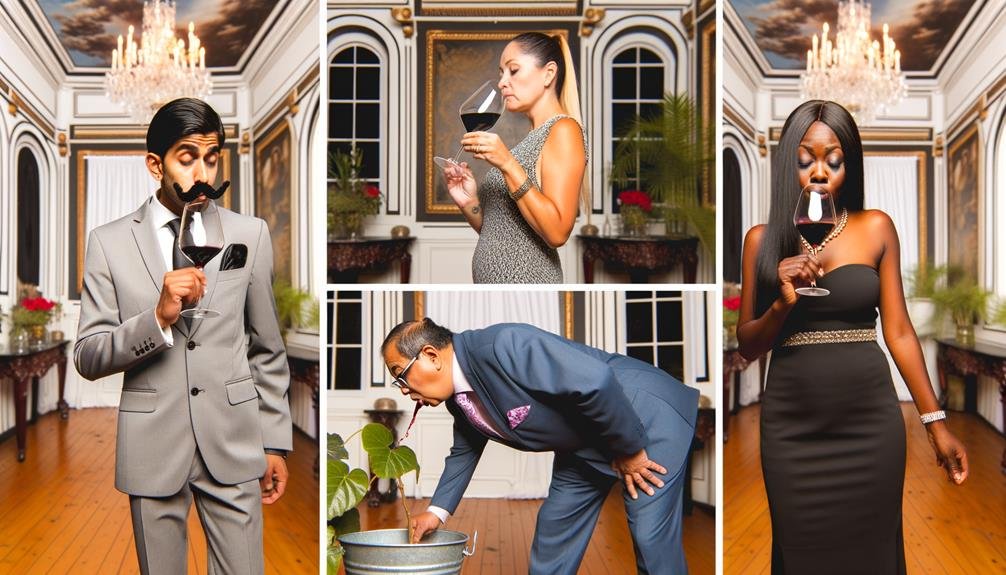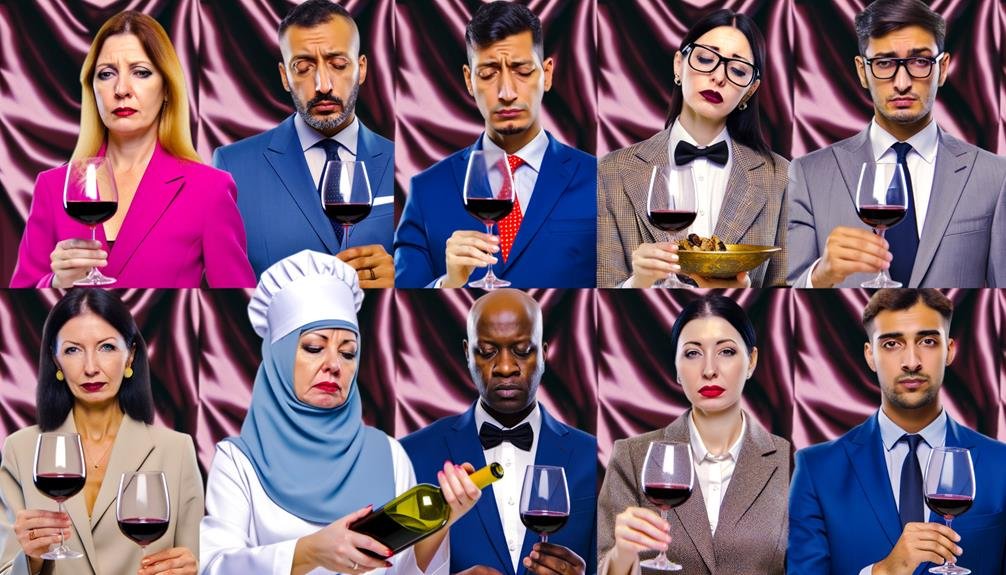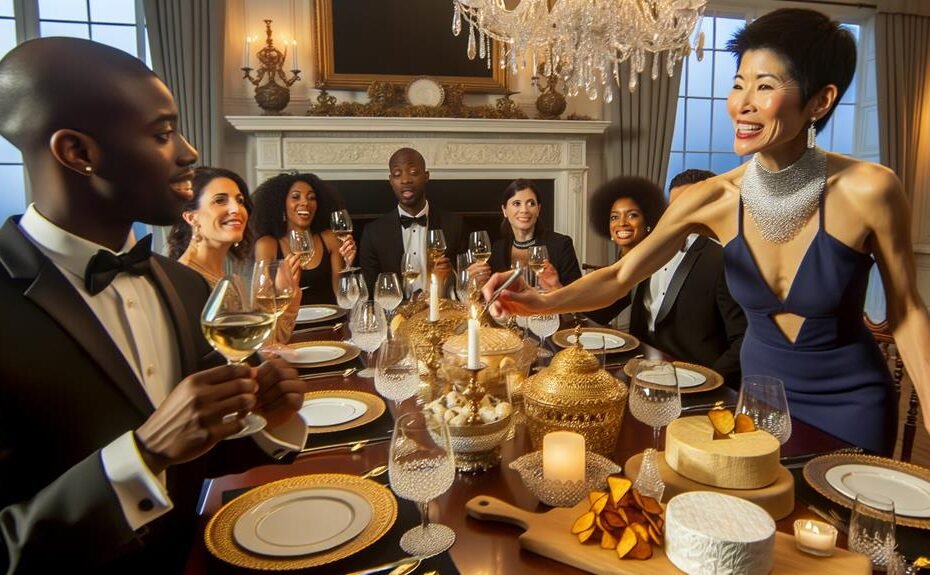I’ve encountered some wine enthusiasts who exhibit extravagant and snobbish behaviors that even surpass royalty. During social gatherings, certain individuals make excessive demands, such as needing to know the precise Champagne dosage before taking a sip. This air of exclusivity often creates a rift, overshadowing the true essence of appreciating wine.
The question arises: is this behavior a quirky aspect of the culture or does it cross a line? Let’s delve into how these attitudes impact the enjoyment of wine events and explore ways to cultivate a more inclusive environment.
When wine connoisseurs make extravagant demands and showcase snobbish behaviors at gatherings, it can hinder the overall enjoyment and appreciation of wine. The focus shifts from savoring the flavors and aromas to meeting elitist standards and demands. This can alienate those who are new to the world of wine or who simply want to enjoy a glass without feeling intimidated or judged. Creating a welcoming and inclusive atmosphere is key to fostering a love for wine among a diverse group of enthusiasts.
To counteract the exclusivity often associated with wine culture, it’s important to emphasize the beauty of diversity in wine appreciation. Encouraging open-mindedness and curiosity about different varietals, regions, and styles can help break down barriers and create a more inclusive environment. Hosting tasting events that highlight a range of wines at varying price points and organizing educational sessions to explore the nuances of winemaking can broaden horizons and invite more people to join the conversation.
Ultimately, the goal should be to celebrate the shared passion for wine and create a sense of community that transcends elitism and snobbery. By promoting inclusivity, diversity, and a welcoming atmosphere, wine events can become more enriching and enjoyable for all participants, regardless of their level of expertise or experience. Let’s raise a glass to a future where the love of wine brings people together, rather than setting them apart.
Pretentious Wine Tasting

Pretentious wine tasting behavior can sometimes be off-putting, as enthusiasts may focus more on impressing others than enjoying the wine itself.
It’s common to witness connoisseurs swirling and sniffing water in their glasses, putting on a show rather than genuinely appreciating the experience. This tendency to correct pronunciation or nitpick about cellar conditions can overshadow the simple pleasure of discovering new wines.
By breaking away from this need to showcase expertise and instead focusing on the joy of exploration, we can truly elevate our wine tasting experiences.
Let’s shift our approach, embracing a more authentic and enjoyable way to savor and learn about wine.
Snobbish Event Actions
At wine events, some wine enthusiasts exhibit snobbish behaviors that can be off-putting to others and take away from the overall experience. It’s disheartening to witness individuals dismiss a glass of wine without even trying it, acting as if they’re above anything less than perfect.
Some even rudely interrupt servers to boast about their exclusive wine club memberships. It’s frustrating when they refuse to give affordable wines a chance, turning their noses up at them. These individuals tend to keep high-end wines to themselves, not sharing with others. These actions create a sense of division, diminishing the enjoyment for everyone involved.
It’s important to promote inclusivity and open-mindedness at wine events, appreciating all wines regardless of their price or reputation. Let’s focus on creating a welcoming and diverse wine community where everyone can feel valued and included.
Ignorant Statements

Many wine enthusiasts often make uninformed comments that betray their lack of true understanding about wine. It’s not uncommon to hear claims that good wine should be free of sediment, but in reality, sediment can naturally occur as wine ages, adding to its complexity.
Additionally, mispronouncing French wine terms or disregarding certain grape varieties as inferior only showcases a limited knowledge of the subject. Some individuals also tend to make unfounded assumptions about wine regions without any substantial basis. These misconceptions frequently circulate among wine circles.
To truly innovate in the realm of wine appreciation, one must approach the subject with an open mind and a thirst for knowledge. By expanding our palate to include a wider range of wines and educating ourselves about different varietals and regions, we can move beyond these outdated myths and gain a deeper appreciation for the diversity and intricacies of the wine world.
Outlandish Requests
Some wine enthusiasts go beyond spreading misconceptions and make outrageous requests that showcase a sense of entitlement and inflexibility.
For instance, I’ve encountered individuals who insist on knowing the Champagne dosage before even taking a sip, as if it holds the key to quality.
There are also those who demand only flagship wine tastings, disregarding the other offerings of a vineyard.
Some adamantly declare their exclusive preference for Cabernet Sauvignons, refusing to try any other varietals.
Moreover, some people order the most expensive bottles just to flaunt their wealth, without truly appreciating the wine inside.
It’s perplexing when enthusiasts refuse to broaden their horizons, sticking rigidly to their preferences and missing out on the diverse world of wine.
Inappropriate Behavior

Inappropriate behavior at wine events can quickly sour the sophisticated atmosphere. Witnessing individuals vomiting into dump buckets not only poses a sanitation issue but also shows a lack of respect.
Using pricey wine as an ashtray is simply ridiculous, while licking wine glasses is cringeworthy and disrupts the event’s decorum. Making exaggerated comments about oak in wine can seem pretentious and disrespectful to the winemaking process.
These actions not only spoil the ambiance but also disrespect the art of crafting fine wines. Remember, wine events are meant for appreciation and learning, not for drawing attention with inappropriate behavior.
Let’s focus on fostering respect and genuine admiration for the craftsmanship involved.
Over-the-Top Reactions
Exaggerated reactions at wine tastings can overshadow the enjoyment of the event, making it feel more like a show than a genuine appreciation of wine. Some individuals boast about knowing the winemaker personally, trying to showcase their status.
Making a fuss over subtle scents or exaggerated gestures during tasting can come off as exaggerated theatrics rather than a sincere love for wine. There are also those who dismiss certain wines as beneath them, which can be seen as snobbish.
Sharing photos of extravagant wine cellars on phones can shift the focus from a communal experience to a display of vanity. These over-the-top behaviors not only disrupt the ambiance but also distance those who are truly interested in savoring and learning about wine.
Entitled Attitudes

Entitled attitudes often surface when individuals opt to bring their own wines to events, disregarding the carefully selected options provided. This behavior can be disruptive and disrespectful, as some guests may believe their choices are superior to those offered by the host, undermining the effort put into curating the selection.
For instance, I’ve personally witnessed guests bringing their preferred wines to an event instead of appreciating the curated selection, which can detract from the overall experience. This kind of behavior not only disrespects the host’s choices but also diminishes the opportunity to explore new and diverse flavors.
In order to address this issue, it’s essential to encourage a more open-minded approach to wine tasting. By educating guests on the principles of wine pairing, highlighting the benefits of exploring diverse wine options, and promoting inclusive discussions, we can create a more welcoming and collaborative atmosphere at events.
This not only enhances the overall experience for all guests but also fosters a culture of appreciation for curated selections and diverse wine experiences.
Exaggerated Displays
In the world of wine enthusiasts, some individuals tend to exaggerate their knowledge and taste preferences to appear more knowledgeable. This can involve behaviors like overly aggressive sniffing during tastings, making dramatic gestures, or boasting about exclusive wine club memberships.
Such displays not only come off as pretentious but also discourage newcomers from exploring the diverse world of wine. It’s important to appreciate wine for its variety and unique experiences instead of fixating on elitist attitudes.
Embracing openness and genuine appreciation can truly enrich one’s wine journey.
Conclusion
To truly enjoy wine, remember that it’s all about how you savor it, not what you possess. By letting go of snobbish attitudes and embracing inclusivity, we can make wine events more inviting.
Instead of focusing on flaunting wealth and exclusivity, let’s celebrate the diverse world of wines together. Wine is meant for enjoyment, not for creating barriers and showing off entitlement.
Let’s keep it simple and welcoming for everyone to appreciate.
